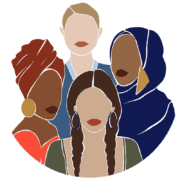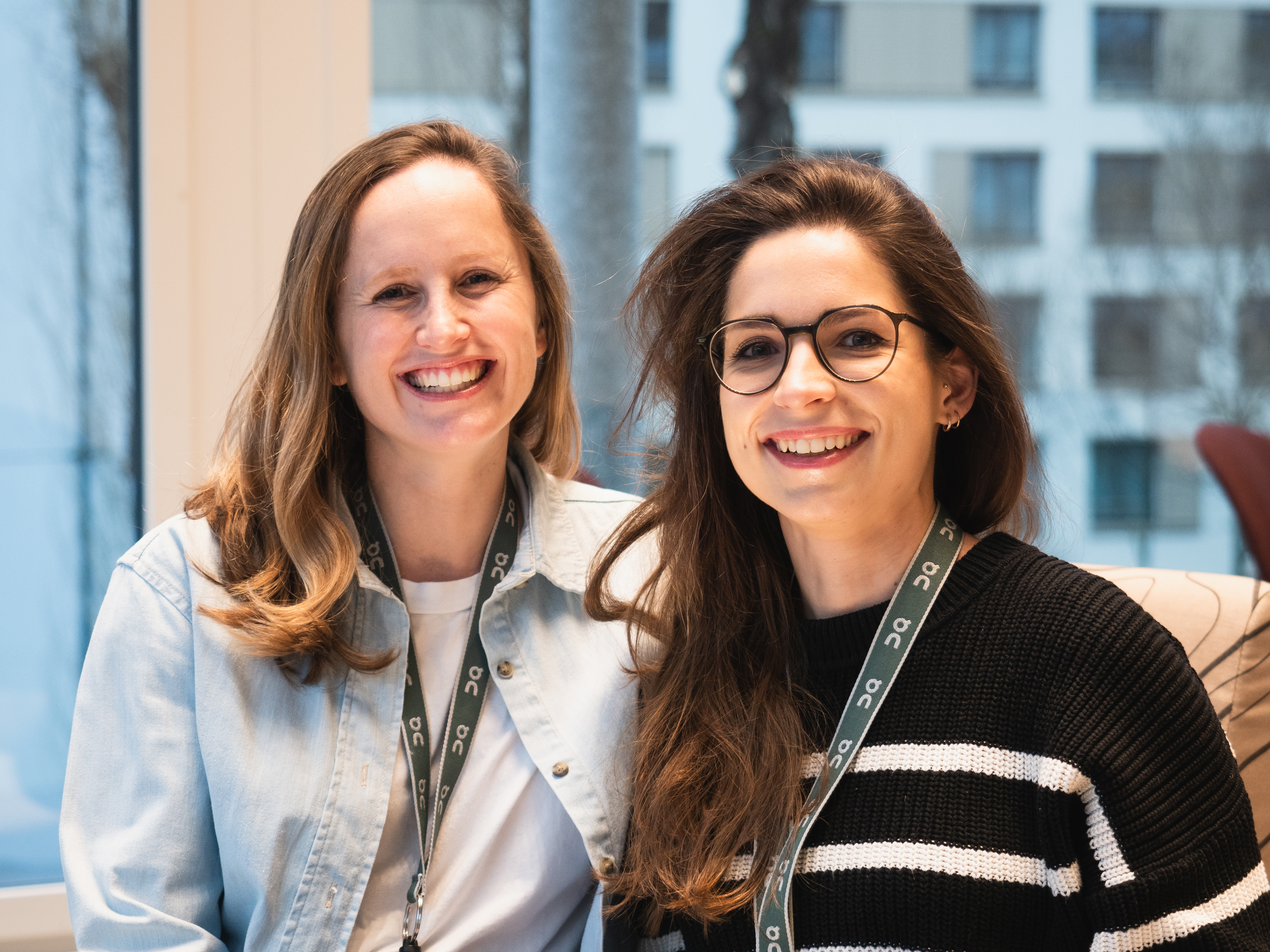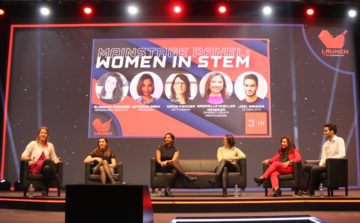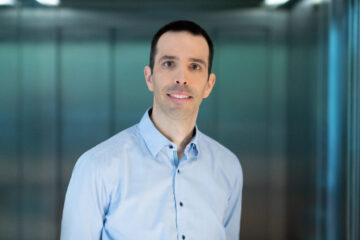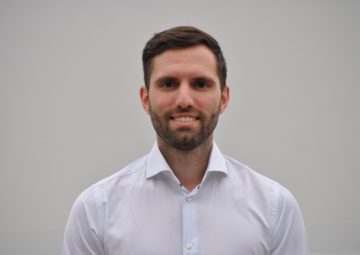Each month we have the honor of interviewing Women Who Inspire Us. As this marks the 20th interview, we decided to try something new and interview not one, but two inspiring women at the same time.
This month we talked to Alexandra Kowalewska, Frontend Engineer, and Sofia Cubillos, Head of Data Analytics, who initiated OnPower, a company-wide network for women in tech at On. Coming from different tech fields, they both learned early on that diverse teams are crucial for success. Read on to learn about how Alex and Sofia made it their mission to break the bias and empower their colleagues to reach their full potential.
Tell us a little bit about yourself, your background and your current position?
Alex: I grew up in Poland and got a master’s degree in finance and accounting. During my studies, I realized that I wanted to do a more technical job and that I didn’t want to work with numbers. I simply didn’t enjoy it. While still at university, I started working as a SAP business analyst, because I thought that this was a more technical role and a bridge topic, where I could work in a team between finance and IT.
After a couple of years working in this role, I decided to change careers. I wanted to have more impact and work in a job where I could be more creative and technical at the same time. So I did some research on what kind of roles and industries would be interesting. This was when I discovered frontend development. I started to learn about it by myself, doing some online courses and reading up on the subject. I really got hooked. I found that it was something truly creative that held enormous development possibilities.
At this point it became clear to me that there was so much information about frontend development that I wouldn’t be able to learn it all by myself. So I decided to sign up for a boot camp for frontend engineers where I could learn the foundations within a couple of months. That was the moment I knew this was what I really wanted to do. I decided to leave my current job and started looking for an internship in frontend engineering. It was also the moment I decided to move to Switzerland, since I got to like the country so much from business trips for my previous employer.
In retrospective, it was a really brave decision to just move here, because I didn’t do much research on the job market in Switzerland. And when I got here, I learned that most internship programs were for students who were studying already. It was really hard to find something as a foreigner who didn’t speak German. I started reaching out to companies directly and went to networking events, which was completely out of my comfort zone.
At one of these meetups, I met someone who introduced me to their boss. The company didn’t have any open internship positions at the time, but we talked and they were interested in creating one. So I went through the interview process and landed my first job in Switzerland. After that I came to On, where I’ve been working as a frontend engineer for three years now.
Sofia: I was born and raised in Chile. I studied industrial engineering where I got a master’s degree. During the last year of my studies, my thesis mentor happened to be a data scientist. I became fascinated by the topic and knew that this was where I wanted to start my career. The work with my thesis guide resulted in my first work experience at a fintech company where I was looking at customer relationships and their behavior with mutual funds.
We did segmentations and predictions of customers based on data science models, which I loved doing. After two years of working there, my husband and I decided to move to Zurich. So I left the company and started looking for a new job in data science, with the hope of finding something in a consumer facing environment.
During my job search I went to a networking event, where I met someone who knew On’s Head of HR. This is how I got to know the company and in the end was offered a job. I started out as a data scientist for e-commerce, and now I am the Head of commercial analytics and consumer insights.
In this unit we have a data science and engineering team, where the more technical work happens, a team of data analysts that are working closely with the business, translating data science and machine learning models, as well as a consumer and market insights team.
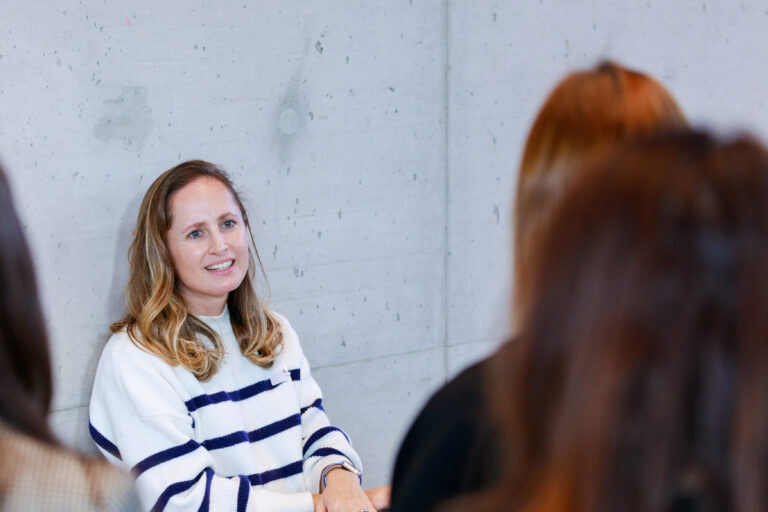
To make it a fair recruiting process, we need to be very conscious of how we assess applications. Women who made it here often didn’t have the same starting point as men.
Sofia, what triggered your interest in studying industrial engineering?
Sofia: In university I first did one year of business administration. The courses I was most interested in were the ones that were very mathematical. That was when I realized that business wasn’t really my thing. I wanted to move closer towards mathematics and physics, the mechanical side of things. So I changed my degree to industrial engineering, which is quite a broad engineering field. You get a little bit of everything, which was ideal, because I didn’t know which type of engineering I wanted to do.
What do you love most about your current role?
Sofia: I would say it’s the mix of the technical and business side. Being a bridge between business and engineering and working with both sides on a daily basis. My job requires me to think of how I interact with the rest of the business, trying to understand what they need, what would make their jobs easier and how they could measure their impact better.
And then bringing that back to the data side, asking what we can build for them to help them succeed at what they’re looking for as well as making sure that both sides are aligned. We don’t want to develop machine learning models just for the fun of it or because it’s interesting. We want to do it because it has meaning and impact on the business side.
Another thing I enjoy about my role is that I’m an advocate for what data can do for other parts of the company. When I was in the e-commerce team, the value of data was pretty clear, because all the data was generated based on the webshop. But now I can promote the value of data to other business teams and show them what we can do for them. It’s very interesting to see the kind of adoption this has had in other teams.
Many didn’t know how data could help them or weren’t aware that certain things were possible, for example tying different KPIs back to their goals, that can be measured on an ongoing basis or developing a model that would make their jobs more efficient.
Alex: There are a couple of things I love about my job. One of them is that every day is different. Working in tech means that you have to learn new things every day. We are being challenged every day with a new problem that needs to be solved. So it never gets boring. Despite what many people think about tech, it’s also a lot about human interactions.
Teamwork is essential. It’s incredible how much a team can achieve by coming together, sharing ideas and knowledge and putting in their combined creativity. This is something I really love about working in tech: It takes real team effort to create something inspiring.

This is something I really love about working in tech: It takes real team effort to create something inspiring.
What does diversity, inclusion and equity mean to you, and how do you promote it at work and beyond?
Sofia: From a business perspective, the more diverse we are, the more we’re talking to a diverse audience. When the decision makers are only a certain group of people, the decisions that are made are going to be limited to this group. So the more diverse representation we have, the better decisions can be made.
This also applies to marketing or product strategies: If we only get insights from a certain group of people, what does that mean for all the other people that we haven’t been able to reach yet? Are we missing market opportunities?
From a team perspective, it’s the same. If I want to grow my team and consider only a certain group of people, I only have limited space to grow.
Another thing that’s important to me is that we need to involve women early on, before they start joining the workforce. When recruiting for an engineering position, usually 80% of the applicants are male. To make it a fair recruiting process, we need to be very conscious of how we assess applications. Women who made it here often didn’t have the same starting point as men.
So it’s not only about the credentials, but also taking into account all the other things that women had to go through to get a CV that says “engineering”, “data science” or “technology”. Because from my own educational experience, there’s a difference: From the professors to the whole environment, it’s not women-friendly. So the fact that women are graduating from those fields despite the challenges they face is already a big step for us.
Alex: For me diversity, inclusion and equity is very important. In an ideal world, everyone would feel equal and valued without regards to their race, gender etc. But unfortunately this is not the world that we’re living in. I’m very privileged to be working at On, because our company brings diversity and inclusion to all of our teams. My engineering development team consists of many people from different nationalities.
This is what diversity means to me: That people come to the office and can bring their own ideas and perspectives. It allows us to grow and broaden our horizons. It also means that diverse people build products for diverse people. And one way we promote diversity and inclusion at On is with the OnPower initiative.
What is OnPower and its purpose?
Alex: The mission of the initiative is to help close the gender gap and help to change the stereotypes which are part of our industry. I was the first female engineer in the digital team in Zurich. After two years working here, the number of female engineers in my team had successfully increased. This was an incredible success. We were able to bring diverse talent into the team and people really enjoyed working together.
We seemed to be doing something right. So I thought, why don’t we spread the word and create an initiative that empowers women in tech and helps build their self-confidence, motivates them to reach their full potential and take on new challenges such as leadership positions. I talked to Marta Kondracka, Sourcing Lead at On, and found out that she was thinking about doing something similar. So we got together and said “let’s try this”.
We started cooperating with our Head of Diversity and Inclusion who helped us get the initiative started and to create a mission and vision, because there weren’t any other inclusion groups before us. During the process, we realized that it would be beneficial for the community to have a senior leader who could inspire them and advocate for the group. That’s when we reached out to Sofia who is an inspiring person and a big motivation for many of us.
We officially launched OnPower one year ago as an inclusion group for our employees, addressing mostly people from our engineering and data teams as well as anyone who identifies as a woman in tech within the organization. Our tech teams are mainly in Zurich and Berlin, and we have some people in the US. For that reason, most of our members didn’t know each other as they work in different teams.
So in our first year, we focused on bringing people together and also wanted to bring everyone closer to our mission and vision to be able to start building on top of that. It’s been going quite well, today we are over 40 people in the group. And thanks to our collaboration with Girls in Tech Switzerland we had our first big inhouse event last year, which was Hacking for Humanity. I’m still reminded of this event with a big smile on my face. It was an incredible experience.
Sofia: Most of the initiatives are internal. It’s mainly about connecting people and communicating what we do. We are sharing stories of inspiring leaders, inviting external guests, doing workshops, etc. In this first year we wanted to understand people’s expectations and their most pressing needs as well as share workplace experiences that affect women. We for example raised awareness that breastfeeding women didn’t have a suitable space for pumping milk in our previous office building, which resulted in a designated parents room in our new office.
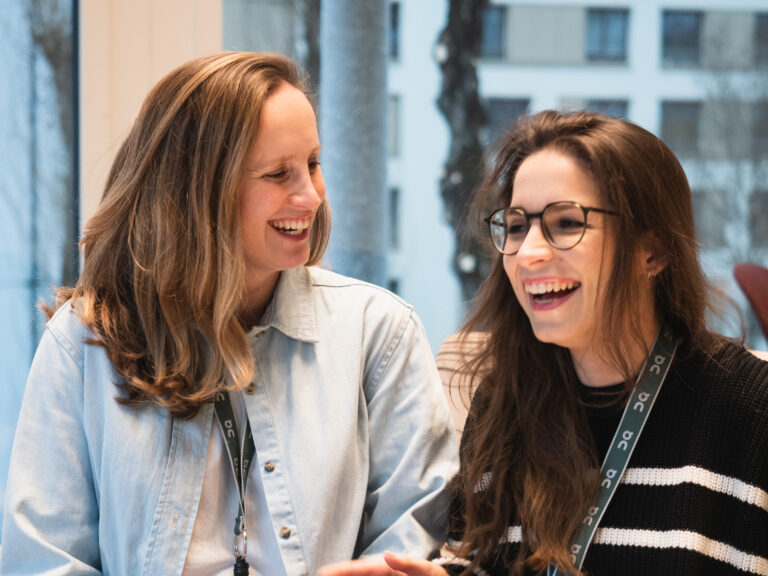
It’s the most powerful feeling when you surround yourself with people who motivate and support you, who help you go through your challenges, and inspire you in your daily life.
What was your motivation to join the initiative?
Sofia: Honestly, I was a little bit surprised that I was asked. Because even though I’m a data scientist, I never really considered myself as a woman in tech. Compared to what engineers do, I didn’t consider myself on that level. But I was excited to join because their mission resonated a lot with what I advocate for: empowering women. My field has always been very male-dominated.
When I think back to my first day in engineering school, I walked into the classroom and out of 80 people there were only six women. It was clear to me from the very beginning, that there was certainly bias, a first barrier. Out of all the students, it was two women who graduated as top of the class. So obviously it’s not a question of lacking capabilities or skills. It’s a barrier that we need to break. That’s why OnPower really resonated with me.
So when Alex and Marta asked me to join, I said “Sure! I don’t know how I can contribute, but I like the idea and the cause. So let’s see what we can do.”
Who inspires you and why?
Alex: I mostly take inspiration from people I’m surrounded by. For me, it’s the most powerful feeling when you surround yourself with people who motivate and support you, who help you go through your challenges, and inspire you in your daily life. Our OnPower initiative is full of women like that. I learned so much from them and their challenges and experiences.
This includes people like Sofia and Marta who are full of inspiration and positive energy. If I didn’t have them around me, I wouldn’t be able to drive this group of 40+ people.
Sofia: I don’t have one specific person, but rather a persona that I stitched together from several situations. It’s a woman who is also a mum, who is able to sit in a room with C-level executives, speaks up for herself, kicks ass and shows how many different perspectives a woman can bring to the table, without feeling inferior.
Because one thing I see with a lot of women around me is that we all suffer from imposter syndrome and believe that we have no idea what we’re talking about. So I find my persona very inspiring and I aspire to be more like her.
What is your next challenge and what are you hoping to achieve in the future?
Sofia: It’s hard to say what’s next for me professionally. If you had asked me five years ago where I would see myself today, I would have never guessed where I’m currently at. So I have no idea what’s in it for me in the future. I would love to continue this initiative and work on having a greater representation, especially in leadership, of women in tech.
This is something that we’re massively lacking and I see a huge opportunity here. If I can work towards that goal, I would be very happy and proud.
Alex: I hope to continue growing the OnPower community and reach and inspire more women, while also collaborating with more external partners. Another thing I’m working on is making our website more accessible. It’s my personal mission to bring what we build closer to people who are not “typical” in a sense, that our products are truly accessible and anyone who wants to can use them.
And in the very far away future, my hope is that we won’t be needing groups like OnPower, because there’s no need for them anymore.
Thank you Alexandra and Sofia for your time and for sharing your story with us. Thank you for being women who inspires us! 💛
Author: Fabienne Lorenz

